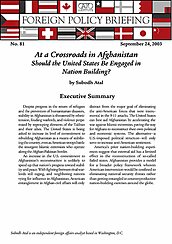An increase in the U.S. commitment to Afghanistan’s reconstruction is unlikely to speed up that nation’s progress toward stability and peace. With fighting between rival warlords still raging, and neighboring nations vying for influence in Afghanistan, American entanglement in Afghan civil affairs will only distract from the major goal of eliminating the anti-American forces that were instrumental in the 9–11 attacks. The United States can best aid Afghanistan by accelerating the war against Islamic extremists, paving the way for Afghans to reconstruct their own political and economic systems. The alternative–a U.S.-imposed political structure–will only serve to increase anti-American sentiment.
America’s prior nation-building experiences suggest that external aid has a limited effect in the reconstruction of so-called failed states. Afghanistan provides a model for a broader policy framework wherein American intervention would be confined to eliminating national security threats rather than getting entangled in counterproductive nation-building exercises around the globe.

